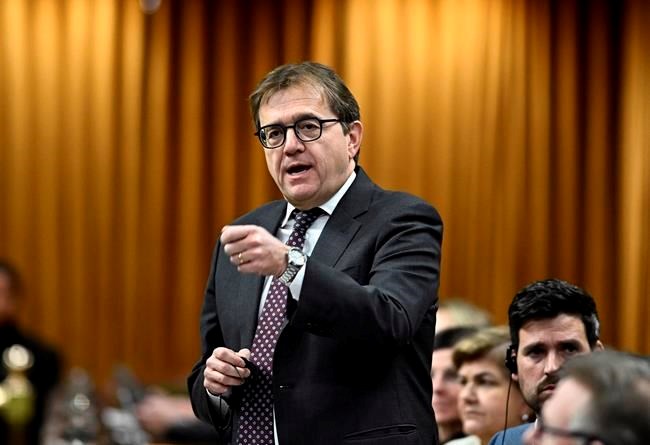OTTAWA — Well before Alberta Premier Danielle Smith started talking about the Sovereignty Act, Ottawa was already taking steps to address the province's concerns about being forced to prematurely shut down its natural gas power plants, says federal Energy Minister Jonathan Wilkinson.
Smith invoked the new legislation earlier this week in what she herself has acknowledged was a message-sending exercise aimed at convincing the federal government to back off in its effort to make energy production across Canada entirely emissions-free.
It didn't seem to work, judging from how the federal Liberals responded Tuesday.
Environment Minister Steven Guilbeault dismissed the whole Sovereignty Act gambit as not even worthy of a court challenge.
"Premier Smith said herself yesterday that the Sovereignty Act is a largely symbolic gesture," he said. "You don't take someone to court for something that's symbolic."
Employment Minister Randy Boissonnault, who represents a riding in Edmonton, said he was perplexed about Smith's move to create a new Crown corporation for electricity in Alberta.
"We’re talking about a conservative premier that wants to nationalize the energy industry in Alberta," Boissonnault said. "Do I need to say anything else? Like, you can’t write that stuff."
Smith, however, sounded undaunted when asked about Guilbeault's dismissal.
"He will learn that if he does not back down from his outrageous and unconstitutional targets in 2035, it will be more than symbolic," she said.
"We'll proceed with developing our baseload power on natural gas with the best available technology and we will make sure that we are able to shield any corporation from any kind of criminal liability."
That could include buying and operating existing plants "so that we're able to continue on with having a reliable power grid," she added.
In an interview Monday with The Canadian Press, Wilkinson said Ottawa had already begun the process of working to address some of Alberta's concerns with the proposed electricity regulations.
"What we've been saying to them is there's flexibility here," he said. "We're not being ideological. Obviously, we want to go as fast as we possibly can. We're not interested in delay, but there is flexibility and we need to actually really look through the data to try to understand what kind of flexibility is required."
Canada wants to have a zero-emission grid by 2035 and in August published draft regulations to get there, including a requirement that natural gas plants operating after 2035 be equipped with technology that captures their emissions. There is, however, a grandfather clause for existing plants and new ones that begin operating before 2025.
Those plants can keep operating without emissions abatement for 20 years from their in-service date.
Alberta and Saskatchewan, which rely heavily on gas for power, have both argued the regulations will leave their grids unreliable, and will unfairly burden consumers with the cost of closing and replacing plants. They want the target to be moved to 2050.
A working group of federal and Alberta officials has met on the regulations four times since August and was set to meet again in December, Wilkinson said.
He said the federal government has been clear to the provinces it would consider making the 20-year grandfather clause longer.
"One of the conversations we are having is we want to avoid stranded assets because that will actually have an impact potentially on rates," he said. "So maybe that 20-year period needs to be slightly longer in order to address what Alberta is talking about.."
"We're trying to actually have conversations that allow us to look at the regulations in a manner that we'll get to the point where it will be reliable, affordable and will be on a trajectory to get to essentially zero emissions. We have not been ideological about this. We've been very pragmatic."
Wilkinson said it's ridiculous to think any government wants power bills to go up or the lights to go out.
"Nobody, no reasonable politician in this country, wants to have a grid that is not reliable, wants to have a grid that is not affordable," he said.
This report by The Canadian Press was first published Nov. 28, 2023.
Mia Rabson, The Canadian Press




